| Source (Hebrew) | Translation (English) |
|---|---|
|
וַאֲנִי עַבְדְּךָ בֶּן אֲמָתֶךָ
אֲדַבֵּר אֲמַלֵּל גְּבוּרוֹתֶיךָ |
I, your servant, the son of your handmaid,
I will speak, I will tell of your might. |
|
דַּרְכֵי שִׁבְחֲךָ קְצָתָם אֲסַפְּרָה
מַעֲשֶׂיךָ מַה נּוֹרָא אֹמְרָה |
I will declare but the uttermost border of the ways of your praise;
I will say how tremendous are your works. |
|
אֵין עֲרֹוךְ אֵלֶיךָ בַּסֵּפֶר
וּשְׁבָחוֹת אַגִּידָה עָצְמוּ מִסַּפֵּר |
Your praises cannot be set forth in a book;
if I would declare them, they would be beyond my power to tell. |
|
חֵקֶר אֱלוֹהַּ לֹא יִמָּצֵא
וְתַכְלִית שַׁדַּי לֹא תִקָּצֶה |
The secret of God cannot be found,
and the perfection of the Almighty cannot be limited. |
|
לִתְבוּנתָוֹ הֲלֹא אֵין חֵקֶר
וּמִסְפַּר שָׁנָיו לֹא יֵחָקֵר |
Is there any searching out Their understanding?
and can the number of Their years be discovered? |
|
גַּם אֵין מִסְפָּר לִגְדוּדֶיךָ
בְּצִבְאוֹתֶיךָ אוֹת כְּבוֹדֶךָ |
There is no number to your troops;
in your hosts is the sign of your glory. |
|
אֵיזוֹ עַיִן אֲשֶׁר תְּעִידֶךָ
וְחַי לֹא רָאָה פְּנֵי כְבוֹדֶךָ |
Where is the eye that shall testify of you?
for none living has seen the face of your glory. |
|
נָבוֹן וְחָכָם הֵן לֹא יֵדָע
וְאֵיךְ אֶעֱרֹךְ עַל אֲשֶׁר לֹא אֵדָע |
The understanding and the wise—lo! they know not;
how then can I set forth that whereof I have no knowledge? |
|
וְאִם אָמַר אִישׁ עַד תַּכְלִיתוֹ
אֶעֱרוֹךְ אַלָיו וּבְמַתְכֻּנְתּוֹ |
If a man should say: “I will prepare meet praise unto Them,
yea, unto the full measure thereof; |
|
אָבֹא וְאֶמְצָא תַּכְלִית שִׁבְחוֹ
לֹא נֶאֶמְנָה אֶת אֵל רוּחוֹ |
I will come and I will discover the perfection of Their praise,”
verily Their spirit is not steadfast with God. |
|
יְבֻלַּע כִּי לֹא יֵדַע עֶרְכּוֹ
אַחֲרִית פִּיהוּ רֵאשִׁית דַרְכּוֹ |
He would be confounded, for he knows not the estimation thereof;
when he has exhausted the words of Their mouth, he has told but the beginning of God’s way. |
|
וְעִמָּדִי לֹא כֵן אָנֹכִי
וּפִי לֹא אֶתֵּן לַחֲטוֹא וְחִכִּי |
It is not thus with me;
I will not suffer my mouth and my lips to sin. |
|
אֲסַפְּרָה לְאַחַי קְצוֹת דַּרְכֵי אֵל
וּלְיִשְׂרָאֵל מַה פָּעַל אֵל |
I will declare unto my brethren but a part of God’s ways,
and unto Israel what God has wrought. |
|
כַּכָּתוּב אִמְרוּ לֵאלֹהִים
מַה נּוֹרָא מַעֲשֶׂיךָ אֱלֹהִים |
As it is written: “Say ye unto God,
How fearsome are your works, O God!” |
|
וְאָמַרְתָּ עַם זוּ יָצַרְתִּי
לִי יְסַפְּרוּ שְׁמִי וּתְהִלָּתִי |
And you have said: “This people which I formed
for myself shall declare my name and my praise.” |
|
בְּמִצְרַיִם שַׂמְתִּי עֲלִילוֹתַי
לְמַעַן סַפֵּר אֶת אוֹתוֹתַי |
“In Egypt I performed my wonders
in order that you should declare my signs.” |
|
וַאֲנִי עַבְדְּךָ עַל כֵּן אֲסַפֵּר
כַּאֲשֶׁר אֶדְרֹשׁ מֵעַל סֵפֶר |
Therefore I, your servant, will declare
that which I may seek out of the Book. |
|
תְּהַלֵל נַפְשִׁי כֹּחַ מַעֲשֶׂיךָ
וְכׇל קְרָבַי אֶת שֵׁם קָדְשֶׁךָ |
My soul shall praise the might of your works,
and all that is within me your holy Name; |
|
וַאֲבָרֶכְכָה בְּכָל עִנְיָנָי
וּבְכׇל לִבִּי אוֹדֶה אֲדֹנָי |
And I will bless you in all my thoughts,
and with my whole heart I will thank the Lord. |
|
גַּם בִּגְרוֹנִי רוֹמְמוֹתֶיךָ
וְאֶת פִּי אֲמַלֵּא תְּהִלָּתֶךָ |
Yea, my throat and my mouth
will I fill with your exaltation and your praise. |
|
כִּי פִי יַגִּיד תְּהִלָּתֶךָ
כׇּל הַיּוֹם אֶת תִּפְאַרְתֶּךָ |
For my mouth shall declare your praise,
and your glory all the day. |
|
וְאֹמְרָה נָּא עֱזוּז נוֹרְאוֹתֶיךָ
וְאָשִׂיחָה דִּבְרֵי נִפְלְאוֹתֶיךָ |
I will say, how mighty are your fearsome deeds;
and I will meditate on the words which tell of your wonders. |
|
וּזְרוֹעֲךָ וֶאֱמוּנָתֶךָ
אוֹדִיעַ כְּפִי גְדֻלָּתֶךָ |
I will make mention of your goodness and your righteous deeds;
your mercies and your might. |
|
יָדַעְתִּי כִּי גָדוֹל אַתָּה
עַל כׇּל אֱלֹהִים מְאֹד גָּדָלְתָּ |
I know that you are great,
that you are very great above all gods. |
|
כִּי כׇּל אֱלֹהֵי הָעַמִּים הֵם
אֱלִילִים אִלְּמִים רוּחַ אֵין בָּהֶם |
For these give no reward unto them that serve them;
wherefore then do they honour them? |
|
הֵן לְעוֹבְדֵיהֶם גְּמוּל אֵין מְשִׁיבִים
וְלָמָּה לָהֶם הֵמָּה מְטִיבִים |
In the time of trouble, then they pray;
but they answer not, nor can they profit them. |
|
וּבְעֵת צָרָה אָז יִתְפַּלְלוּ
וְלֹא יַעֲנוּם כִּי לֹא יוֹעִילוּ |
They seek with all their heart that which has no spirit;
but the Lord is nigh unto the people near unto Them. |
|
דּוֹרְשִׁים בְּכׇל לֵב לְרוּחַ אֵין בּוֹ
וְקָרוֹב יְיָ אֶל עַם קְרוֹבוֹ |
For all the gods of the heathen are dumb idols;
there is no spirit in them. |
|
הַיוֹצֵר כֹּל הוּא אֱלֹהֵינוּ
הוּא עַשָׂנוּ וְלוֹ אֲנָחְנוּ |
They who have formed all, They are our God;
They made us, and unto Them alone do we belong, |
|
עַם מַרְעִיתוֹ וְצֹאן יָדוֹ
נְבָרֵךְ שְׁמוֹ כִּי לְעוֹלָם חַסְדּוֹ |
People of Their pasture and sheep of Their hand;
we will bless Their Name, for Their mercy endures for ever. |
|
בַּצַּר לָנוּ מְאֹד נִמְצֵאתָ
כִּי דוֹרְשֶׁיךָ לֹא עָזָבְתָּ |
In our distress you are verily found of us,
for you forsake not those that seek you. |
|
וְתָמִיד בְּפִינוּ תְּהִלָּתֶךָ
וּמְהַלְלִים לְשֵׁם תִּפְאַרְתֶּךָ |
And continually is your praise in our mouth,
praises unto your glorious Name. |
|
עֵד אַתָּה בְּךָ וּבִכְבוֹדֶךָ
וּמְשָׁרְתֶיךָ אַף עֲבָדֶיךָ |
You are witness of yourself and of your glory;
yea, also your ministering angels and your servants, |
|
אֲשֶׁר כְּבוֹדְךָ מְלֹא כׇל הָאָרֶץ
וְהוֹדְךָ עַל כׇּל הָאָרֶץ |
That your glory is the fulness of the whole earth,
and that your glory is over all the earth. |
|
וַאֲבוֹתֵינוּ בָּחֲרוּ אוֹתָךְ
לְבַדָּךְ לַעֲבֹד וְאֵין זָר אִתָּךְ |
Our fathers chose you alone
to serve, and no strange god beside you. |
|
גַּם אֲנַחְנוּ אוֹתְךָ לְבַדֶּךָ
נַעֲבֹד כְּבֵן אָב וּנְכַבְּדֶךָ |
We also will serve you alone,
and, as a son his father, will we honour you. |
|
וְהִנְנוּ עַל יִחוּדֶךָ
יוֹמָם וָלַיְלָה עֵדֶיךָ |
Behold us, your witnesses by day and by night,
to declare your unity. |
|
בְּפִי כֻלָּנוּ וּבִלְבָבֵנוּ
שָׁאַתָּה לְבַדְּךָ אֱלֹהֵינוּ |
Yea, all of us declare from our heart
that you alone are our God. |
|
אֱלֹהֵינוּ עַל יִחוּדֶךָ
עֵדִים אֲנַחְנוּ וַעֲבָדֶיךָ |
You are our God;
we are witnesses to your unity, we your servants. |
|
אֵין תְּחִלָּה אֶל רֵאשִׁיתֶךָ
וְאֵין קֵץ וְתִכְלָה לְאַחֲרִיתֶךָ |
There is no beginning to your existence,
neither is there any limit or end to your being; |
|
רִאשׁוֹן וְאַחֲרוֹן מִבְּלִי רֵאשִׁית
וּמִבְּלִי אַחֲרִית וְאֵין לֵב לְהָשִׁית |
First and last, without beginning
and without end; no heart can conceive it. |
|
אֵין קִצְבָּה אֶל גַּבְהוּתֶךָ
וְאֵין סוֹף לְעֹמֶק מִדּוֹתֶיךָ |
There is no limit to your exaltation,
and there is no fathoming the depth of your attributes. |
|
אֵין לְךָ סוֹבֵב וְאֵין לְךָ פֵּאָה
עַל כֵּן אוֹתְךָ חַי לֹא רָאָה |
There is no boundary unto you nor any limit;
wherefore none living has seen you. |
|
אֵין צַד וְצֶלַע יַצְלִיעוּךָ
וְרֹחַב וְאֹרֶךְ לֹא יַמְצִיעוּךָ |
Surface and side do not enclose you;
to you neither breadth nor length nor depth can be ascribed. |
|
אֵין פֵּאָה לִסְבִיבוֹתֶךָ
וְאֵין תָּוֶךְ מַבְדִּיל בֵּינוֹתֶךָ |
There is no confine that can encompass you,
neither is space contained within you. |
|
אֵין חָכְמָה אֲשֶׁר תֵּדָעֶךָ
וְאֵין מַדָּע אֲשֶׁר יַגִּיעֶךָ |
There is no wisdom that can know you,
and no knowledge that can approach you; |
|
לֹא יַשִּׂיג אוֹתְךָ כׇּל מַדָּע
וְאֵין שֵׂכֶל אֲשֶׁר יָבִין וְיֵדָע |
For naught of it can reach unto you,
and there is no intelligence that can understand and know |
|
עִמְּךָ מְאוּמָה וְאֵיכָה אַתָּה
וְאֵיךְ בְּלִי מְאוּמָה כֹּל בָּרָאתָ׃ |
Aught of you whatsoever,
or how, from nothing, you have created all. |
This is the shir ha-yiḥud l’yom sheni (hymn or song of unity for the second day), as translated by Nina Salaman and published in the maḥzor for Yom haKippurim by Arthur Davis and Herbert Adler (1904). I have made changes to the translation, mainly to update archaic language and disambiguated terms for animals and Temple offerings. I’ve also replaced male default language for God with gender inclusive terms. The transcription of the shir published here is based first on the unvocalized text found in Lia van Aalsum’s dissertation, “Lied van de eenheid. Een onderzoek naar de bijbelse intertekstualiteit van het spirituele geschrift Sjier haJichoed” (2010), pp. 45-47. Dr. Van Aalsum’s transcription was itself derived from the published transcription of Abraham Meir Habermann (Mosad haRav Kook: 1948) based on a commentary on the Shir haYiḥud by Rabbi Yom Tov Lipmann Muelhausen (Thinegen 1560) republished in a facsimile edition in 1982 by Joseph Dan. I have revocalized the text according to A.M. Habermann’s work. –Aharon Varady
In his introduction to a facsimile edition of the Shir haYiḥud published by Joseph Dan in 1982, the scholar writes:
“Shir ha-Yiḥud”, “The Hymn of Divine Unity”, is a theological poem, composed in Central Europe in the second half of the 12th century by a Jewish theologian or mystic who probably belonged to the sect of the Ashkenazi Ḥasidim (Jewish-German Pietists). This poem became one of the most famous poetic works to be included in the Jewish prayer-book, and had great impact upon the development of theological poetry in Hebrew. To some extent it can be compared to the famous “Keter Malchut” by Rabbi Shlomo ben Gevirol; both poems gave expression to the deepest religious attitudes found in the Jewish cultures which created them.
“Shir ha-Yiḥud” is an anonymous poem, even though some editions, including the one reproduced here, attribute it to the leader of the Ashkenazi Ḥasidic movement, Rabbi Judah ben Samuel the Pious, who lived in Spyer and Regensburg in the second half of the 12th century and the beginning of the 13th (died in 1217). In one of the esoteric theological works of Rabbi Judah, written circa 1200, this poem is quoted, and attributed to a “poet”, as if it were an old, well-known work of liturgy (Ms. Oxford 1567, 4b-5a). This could be seen as conclusive evidence that Rabbi Judah did not write this poem, for an author does not, usually, quote his own work in this way. However, the possibility that Rabbi Judah was the author should not be rejected off-hand. It is a fact that Rabbi Judah insisted, in his ethical works, that books and hymns shouid be published anonymously, for the inclusion of the author’s name in them might cause his descendants to commit the sin of pride. We do not have works by Rabbi Judah signed by him, and it seems that he himself scrupulously observed this maxim, though even his closest disciple, Rabbi Eleazar of Worms, did sign all his work in his full name. In the same theological treatise Rabbi Judah quoted “Sefer Ḥasidim”’, his major ethical work, several times, as an anonymous work. However, we do lack a positive indication that proves him to be the author. It seems that by the thirties of the 13th century no clear tradition existed in Germany concerning the authorship of the hymn. In Rabbi Moses Taku’s polemical work, “Ketav Tamim”, the hymn is mentioned twice and attributed to “Rabbi Bezalel and Rabbi Samuel’, and it is evident that Rabbi Moses did not know anything about the author of the work.
The theology of the Shir ha-Yiḥud is based to a very large extent on the text of Rav Saadia Gaon’s Book of Beliefs and Ideas, but not on the original text (in Arabic) or the standard 12th century translation by Rabbi Judah ben Tibbon, but on an early paraphrase of the work, probably made in the 11th century. This paraphrase transformed Rav Saadia’s philosophical treatise into a poetic description of God’s greatness, and several passages of such descriptions were included in the “Shir ha-Yiḥud” almost verbatim. The author in medieval Germany used Saadia’s material to introduce to his own community some basic concepts concerning the creation and the nature of God, emphasizing his remoteness from any corporeal description and insisting especially on the divine immanence throughout the cosmos. Rabbi Moses Taku’s criticism of the work concentrated on this aspect of the hymn’s theology, for Rabbi Moses objected to the new, philosophical attitude towards God which began to spread in the Jewish community in Germany at that time, mainly through the teachings of the Ashkenazi Ḥasidim.
The Shir ha-Yiḥud is the first step in the evolvement of a whole literary genre, which developed in Germany in the 13th century and produced nearly a score of treatises, most of them including the term “Yiḥud” (divine unity) in their titles. These works, written by the Ashkenazi Hasidim, popularized the theology influenced by Saadia, insisting on divine transcendence and immanence at the same time, rejecting anthropomorphic concepts of God and explaining divine revelation in non-corporeal terms. These works were written in prose, leaving Shir ha-Yiḥud as one of the very few examples of Jewish theology of this period expressed in poetic form. One more example, however, is published here — a theological poem which was written in a circle of Jewish mystics late in the 12th century, which was included in several works, among them those of Rabbi Elhanan ben Yaqar of London (middle of the 13th century). This poem was probably written in order to serve as a basis for a theological exegesis, for, unlike Shir ha-Yihud, it is brief and cryptic. These two examples serve, however, to demonstrate the role that poetry played in the emergence of Jewish esoteric and mystical literature in Central Europe.
Source(s)

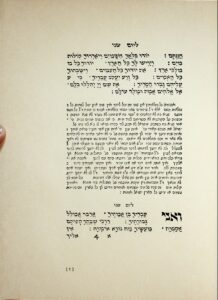
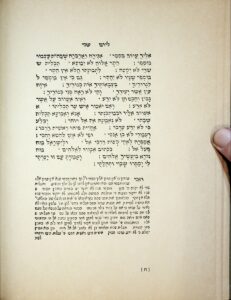
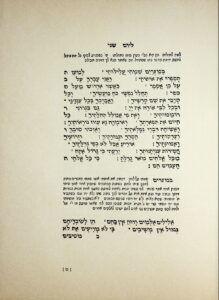
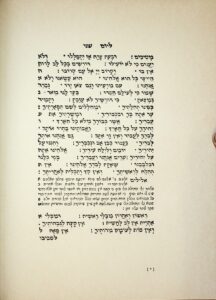
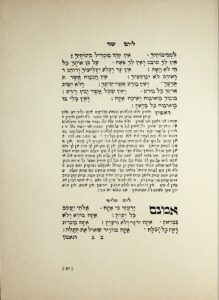



![Shir haYihud l’Yom Sheni (Thinegen 1560 [facsimile]), p. 7 – crop](https://opensiddur.org/wp-content/uploads/2025/08/shir-hayihud-lyom-sheni-thinegen-1560-facsimile-p--7-crop.jpg)